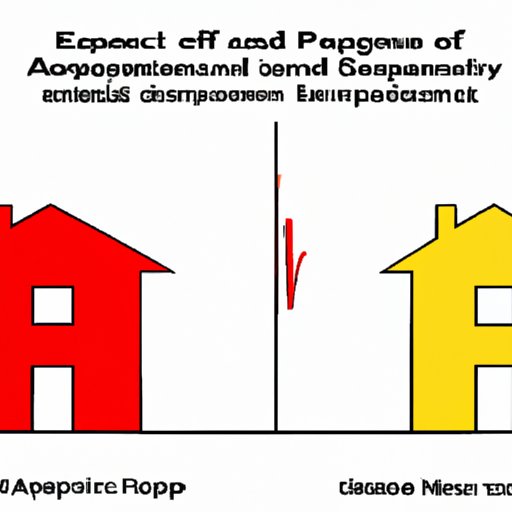Introduction
Are you considering buying or selling a property? Or maybe you are curious about how the real estate market works? One crucial aspect that often confuses homeowners and buyers is the appraisal gap. The appraisal gap can have a significant impact on real estate transactions, affecting both the financial aspects and negotiation power of the parties involved.
In this article, we aim to demystify the appraisal gap and provide strategies for homeowners and buyers to navigate and overcome this problem in the real estate market. By understanding how the appraisal gap works and adopting the right tactics, you can ensure a smooth and successful real estate transaction.
Demystifying the Appraisal Gap: Understanding How it Works
Before we delve into the strategies for navigating the appraisal gap, let’s first define and explain what exactly the appraisal gap is. The appraisal gap refers to the difference between the appraised value of a property and the agreed-upon purchase price between the buyer and seller.
Several factors contribute to the appraisal gap. Rapidly changing real estate markets, lack of comparable sales data, and the subjective nature of appraisals can all lead to a gap between the appraised value and the purchase price. To better understand how the appraisal gap can occur, let’s explore a few case studies or examples where this issue has arisen.
The Appraisal Gap Explained: What Buyers and Sellers Need to Know
How the Appraisal Gap Impacts Buyers
For buyers, the appraisal gap can have significant financial consequences. If the appraised value falls below the agreed-upon purchase price, buyers may be required to cover the difference out of pocket, as lenders typically base their financing on the appraised value. This shortfall can be an unexpected burden for buyers who have budgeted based on the agreed-upon purchase price.
To protect their interests, buyers can employ several strategies. One effective strategy is to include an appraisal contingency in the offer, allowing them to renegotiate or even back out of the deal if the appraisal comes in too low. Consulting with a real estate agent experienced in negotiation can also provide valuable insights and guidance throughout the process.
How the Appraisal Gap Impacts Sellers
On the other hand, sellers facing an appraisal gap may experience reduced negotiation power. If the appraised value is significantly lower than the agreed-upon purchase price, potential buyers may use this as leverage to negotiate a lower price or walk away from the deal entirely.
Sellers can handle a low appraisal by considering a few tips. Firstly, they can have realistic expectations when listing their property by researching recent sales of similar properties in their area. Pre-appraising the property before listing can also help determine its market value and avoid surprises later. Sellers can also explore options such as appealing the appraisal or making improvements to enhance the property’s value.
Bridge Over the Appraisal Gap: Strategies for Navigating the Real Estate Market
Importance of Realistic Pricing
One of the fundamental strategies for navigating the appraisal gap is to set the right listing price. It’s crucial for sellers to conduct thorough research and consider factors such as recent sales, market trends, and the property’s unique features. Pricing the property too high can lead to a wide appraisal gap and deter potential buyers.
Additionally, sellers can consider conducting a pre-appraisal, which involves hiring a licensed appraiser to assess the property’s value before listing it. This step can help sellers have a realistic understanding of the property’s worth and avoid disappointment when the formal appraisal is conducted later.
Enhancing the Property’s Value Prior to Appraisal
Another strategy to bridge the appraisal gap is to enhance the property’s value before the appraisal. Simple home improvements and renovations, such as upgrading kitchens or bathrooms, can increase the perceived value of the property. Investing in proper staging and presentation techniques can also leave a positive impression on the appraiser and potentially lead to a higher appraised value.
It is crucial to note that sellers should be mindful of their budget and focus on improvements that offer the best return on investment. Consultation with a real estate professional can provide valuable guidance on the most effective ways to enhance a property’s value.
Closing the Appraisal Gap: Tactics for Successful Negotiations
Building Strong Relationships with Appraisers
Building a strong relationship with the appraiser is a vital tactic for successful negotiation. As a buyer or seller, you can provide relevant information to the appraiser, such as recent upgrades or renovations, that may not be visible at first glance. Additionally, sharing comparable sales data or recent listings can help create a more accurate picture of the property’s value.
It’s essential to communicate professionally and respectfully with the appraiser. They are independent professionals tasked with providing an objective assessment of the property’s value. Building a positive rapport can go a long way in influencing their evaluation.
Presenting an Appeal in Case of a Low Appraisal
If faced with a low appraisal, buyers and sellers have the option to present an appeal. This process involves gathering evidence, such as recent comparable sales or expert opinions, to support a higher value. Working with real estate agents and legal professionals who are well-versed in the appeal process can significantly increase the chances of a successful appeal.
It is crucial to approach the appeal process with an open mind and realistic expectations. While it is possible to get an appraisal adjustment, succeeding in an appeal is not guaranteed. A thorough understanding of the appraisal report and expert guidance is essential for a compelling appeal.
Appraisal Gap 101: A Comprehensive Guide for Homeowners and Buyers
The Role of Appraisals in Real Estate Transactions
Appraisals play a vital role in real estate transactions as they provide an unbiased assessment of a property’s value. Lenders use appraisals to ensure that the property is worth the amount they are lending, providing a measure of security for both buyers and lenders. Appraisals also help buyers avoid overpaying for a property and sellers understand the market value of their property.
Steps Involved in the Appraisal Process
The appraisal process typically involves several steps. First, the lender orders an appraisal from a licensed appraiser. The appraiser visits the property and conducts a thorough examination, taking into account factors such as the property size, condition, location, and recent comparable sales in the area. The appraiser then prepares an appraisal report, which includes an estimate of the property’s value.
How to Interpret and Analyze an Appraisal Report
Interpreting and analyzing an appraisal report requires some knowledge of the terminology and factors considered by appraisers. The report includes details about the property, such as its physical characteristics, comparisons to similar properties, and the appraiser’s estimate of value. Understanding these components can help buyers and sellers make informed decisions and respond effectively to appraisal results.
Common Myths and Misconceptions about Appraisals
There are several common myths and misconceptions surrounding appraisals. For example, many believe that the appraised value always matches the purchase price, which is not always the case. It’s essential to have a realistic understanding of how appraisals work to navigate the real estate market effectively. Dispelling these myths can save buyers and sellers from unnecessary stress and confusion.

The Economic Implications of the Appraisal Gap: Effects on the Housing Market
Impact of Appraisal Gaps on Housing Affordability
The appraisal gap can have significant implications for housing affordability. When properties appraise lower than the purchase price, buyers may struggle to secure financing or face additional costs to cover the shortfall. In areas with high appraisal gaps, affordability becomes a pressing concern, limiting access to homeownership for many buyers.
Consequences for Local Real Estate Markets
Appraisal gaps can also impact local real estate markets. When properties consistently appraise below the purchase price, it can create a perception that the market is overvalued or experiencing a downturn. This perception may lead to decreased buyer confidence, lower demand, and potentially impact property values in the area.
Potential Solutions or Policies to Address the Appraisal Gap
In response to the appraisal gap issue, policymakers and industry professionals have proposed various solutions. Some suggest improving data collection and transparency in the appraisal process, while others recommend revisiting the criteria used to determine property values. Exploring alternative valuation methods or implementing policies to address market volatility can also help mitigate the appraisal gap problem.
Breaking Down the Appraisal Gap: Insights from Real Estate Experts
Interviews or Quotes from Real Estate Professionals
To gain further insights into the appraisal gap and the real estate market, we reached out to experienced real estate professionals. According to John Johnson, a seasoned real estate agent, “Understanding the appraisal gap is crucial for both buyers and sellers. By adopting strategies such as conducting pre-appraisals and appealing low appraisals, buyers and sellers can ensure fair transactions.”
Perspectives on the Causes and Solutions for the Appraisal Gap
Real estate professionals have varying perspectives on the causes and solutions for the appraisal gap. Some believe that rapidly changing market conditions contribute to the gap, while others emphasize the need for better appraiser training and standardization across the industry. An open dialogue and collaboration among industry experts can help identify effective solutions to bridge the appraisal gap.
Tips and Advice from Experts on Navigating the Real Estate Market
Real estate experts offer valuable tips and advice for successfully navigating the real estate market, especially when dealing with appraisal gaps. They stress the importance of working with knowledgeable real estate agents, conducting thorough research, and maintaining realistic expectations throughout the process. Embracing proactive strategies and seeking expert guidance can help buyers and sellers overcome appraisal gaps.
Conclusion
The appraisal gap can be a complex and challenging aspect of the real estate market. By understanding how it works and implementing the strategies outlined in this article, homeowners and buyers can navigate this hurdle with confidence. Remember the importance of realistic pricing, enhancing property value, building strong relationships with appraisers, and presenting appeals when needed. Take proactive steps, seek expert advice, and embrace open discussions to address the appraisal gap successfully. With the right approach, you can achieve success in your real estate transactions.
(Note: Is this article not meeting your expectations? Do you have knowledge or insights to share? Unlock new opportunities and expand your reach by joining our authors team. Click Registration to join us and share your expertise with our readers.)
